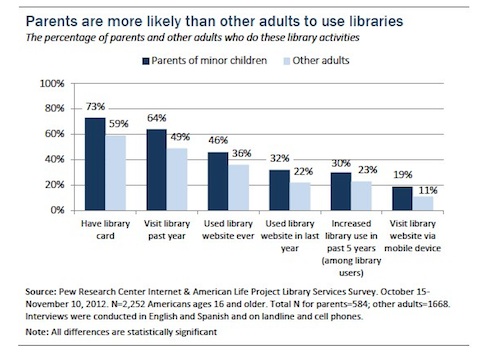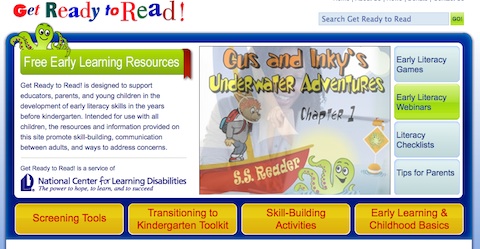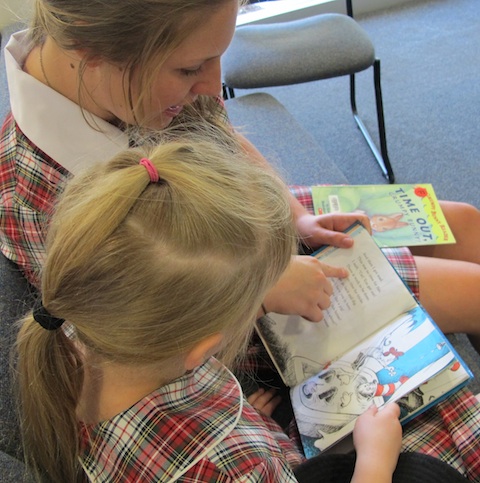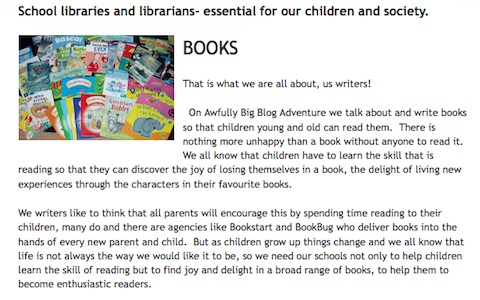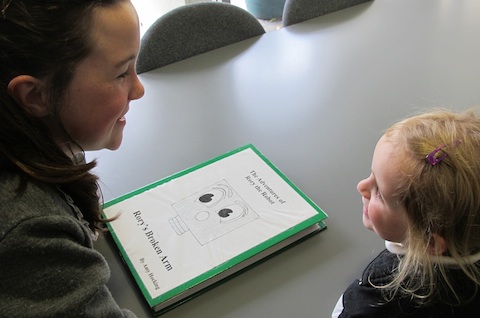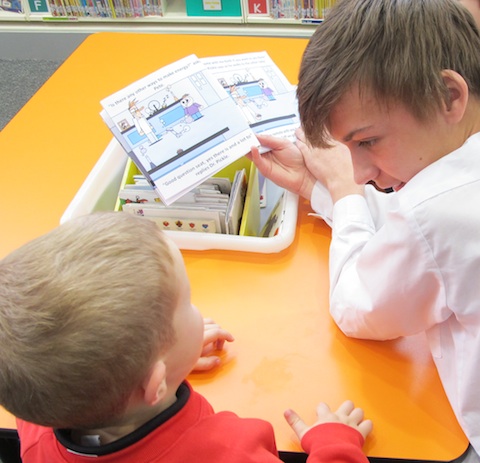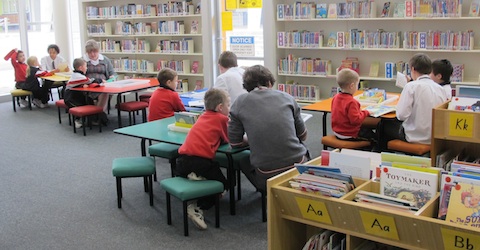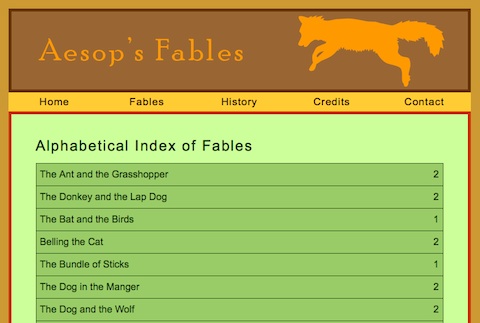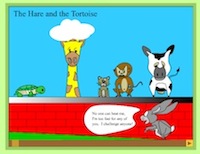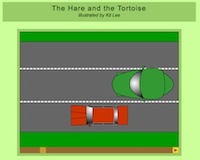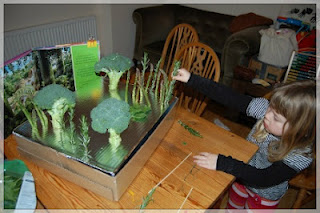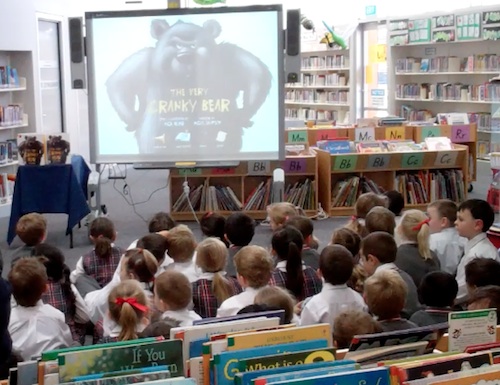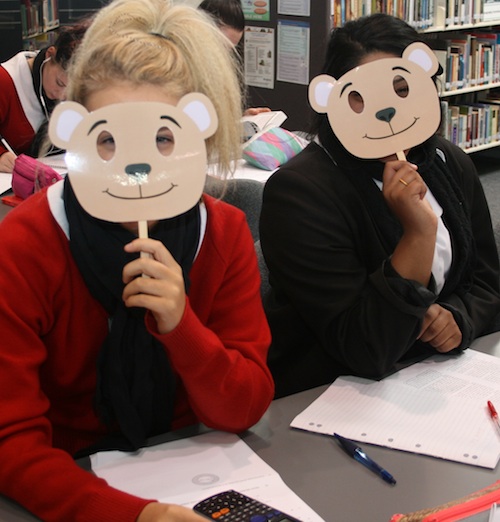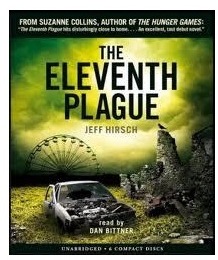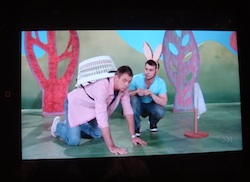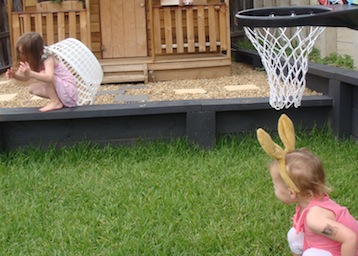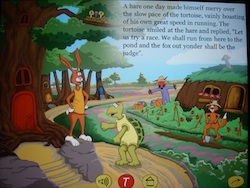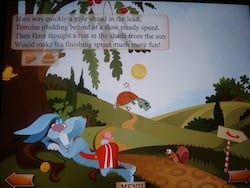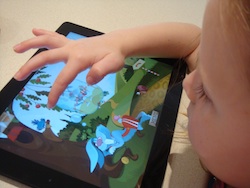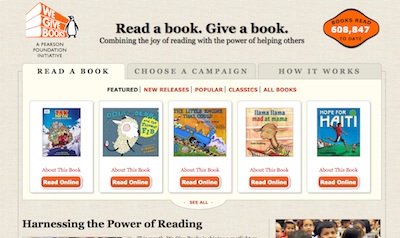I remember very well the enjoyment of reading aloud and sharing books with my children – even into their teenage years.
This post by Katherine Stone lists seven good reasons to keep on doing this.

Tag Archives: Reading
New research report on libraries and reading
Research into Parents, Children, Libraries, and Reading by Carolyn Miller, Kathryn Zickuhr, Lee Rainie and Kristen Purcell was released on 1 May by the Pew Internet & American Life Project. The findings and report cover:
- Library visits by children
- Parents themselves are considerably more likely than other adults to use library services
- Parents are more likely to be interested in expanding library services and adding future tech-related services
- Mothers stand out when it comes to reading and libraries
- Lower income parents are more likely to view library services as very important
The vast majority of parents of minor children — children younger than 18 — feel libraries are very important for their children. That attachment carries over into parents’ own higher-than-average use of a wide range of library services.
…This report is part of a broader effort by the Pew Research Center’s Internet & American Life Project that is exploring the role libraries play in people’s lives and in their communities.
Towards Reading – preschool literacy support activities
Although this site is mainly for parents and teachers of preschool age children, it would also be invaluable for teachers of students with learning difficulties. The activity cards for pre-reading awareness are delightful, with very creative ideas for making things to promote a desire to read or understand the purpose and need for text. (Also useful for a grandmother’s toolkit!)
Making use of our K-12 library again!
Yesterday the Year 9 Child Studies students came to the IRC for their lesson . First they were taught about the stages of the development of literacy skills from birth to school age, with emphasis on the importance and inter connectivity of all forms of communication. The use of books, digital or print, as a foundation for literacy development was demonstrated with illustrations from baby’s first recognition of shapes on a page. The introduction of words that eventually introduce concepts of fantasy as distinct from reality was then discussed – the problems this can cause and the fun this can initiate.
The Year 9 students looked at the K-2 collection of books and as Year 3 was in the IRC ‘borrowing’ books at the time, their teacher allowed us to ‘borrow’ the students in 3B to read them stories and discuss their story choices. A great time was had by all!
School Libraries and Teacher Libarians promoting literacy
In her latest post in An awfully big blog adventure, award winning author of 60 books for children and teens, Linda Strachan says:
We all know that children have to learn the skill that is reading so that they can discover the joy of losing themselves in a book, the delight of living new experiences through the characters in their favourite books
…we need our schools not only to help children learn the skill of reading but to find joy and delight in a broad range of books, to help them to become enthusiastic readers.
She goes on to discuss the role played by the school and Teacher Librarian in the of promotion of books and reading.
A special moment in our K-12 library – National Year of Reading
Aesop’s Fables: Digital presentations
School Holidays! Celebrate the National Year of Reading with special activities
Why not use these holidays to inspire a love of reading. Activities that bring a story to life can also bring a family closer together. The Book Chook blog has a post this week full of ideas of how to do this.
Zoe Toft says she “Plays by the book” because
- it’s fun!
- it gives me a focus and outlet for my desire to be creative
- it helps me find a mutually enjoyable way of being with the kids
- it shows the kids how much I value the book
She goes on to explain ways to bring a book to life with three failsafe activities
Benefits of K-12 Libraries! National Simultaneous Storytime
Yesterday we celebrated reading and picture books by taking part in the National Simultaneous Storytime event. Right across Australia, in schools and public libraries, children gathered to read The very cranky bear by Nick Bland at 11:00AM.
Three Kindergarten classes came to the IRC where they were enthralled to see and hear the story unfold through the use of the iPad App “The very cranky bear” which was screened on the Smart Board.
A group of Year 10 students then performed a Reader’s Theatre production of the book
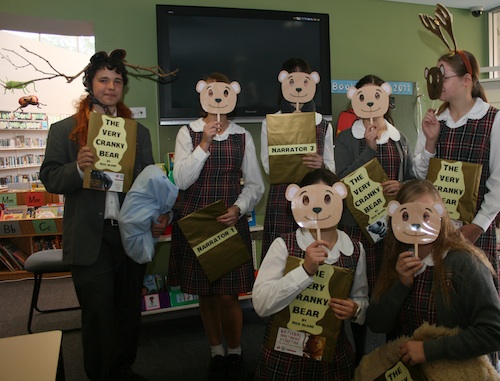
…after which the children heard the story again – taking the part of the bear. Roars of sixty very “cranky bears” filled the IRC followed by the appearance of Happy Bear masks at the end of the story.
Not many of the thirty Senior Year 12 students “studying” in the IRC did much work that period – they also chose to enjoy the experience!
Free audio books – Pairing Young Adult fiction with classics
Download links will be posted at www.audiobooksync.com.
Teens can get two free audiobook downloads each week this summer for ten weeks through SYNC, a joint venture between audiobook publishers and AudioFile Magazine.
For ten weeks two audio books per week will be able to be freely downloaded. One will be a Young Adult fiction and the other a classic of similar theme.
The first pair will be: “June 14-20:The Eleventh Plague by Jeff Hirsch (Scholastic Audiobooks) and The Grapes of Wrath by John Steinbeck, adapt. by Frank Galati (L.A. Theatre Works)”
Maurice Saxby – A real inspiration to all Teacher Librarians – and to this Nanna as well!
Maurice Saxby spoke at the Awards Night for the School Library Association of NSW on 30 March held at the Children’s Bookshop at Beecroft.
 In 1955 Maurice Saxby was the second Teacher Librarian ever to be appointed to a school in New South Wales. He has inspired teachers and Teacher Librarians for many years and his book “Give them wings” impelled many to offer exciting opportunities for children to experience literature.
In 1955 Maurice Saxby was the second Teacher Librarian ever to be appointed to a school in New South Wales. He has inspired teachers and Teacher Librarians for many years and his book “Give them wings” impelled many to offer exciting opportunities for children to experience literature.
He spoke of his own encounter with books and reading as a young boy and told us of the influence of the special teachers he had as a child – who inspired in him a love of literature simply by reciting a poem or leading a discussion. Teachers, parents and even ‘Nannas’ still do this today but we now have at our fingertips so many rich resources to extend these experiences even further.
Maurice told us why reading literature is important: “Apart from what we see about human beings when we read and what we find out about life, we’re attuned to story and to the shape of story and to the way words work.”
The night of the awards I went to stay at the home of my son where I regularly read books to my two granddaughters and we make up and enact imaginary stories. With renewed energy to instill a love of literature and reading into the lives of these two little girls, aged two and four, I seized hold of opportunity and here is what enfolded the next morning.
As usually happens, the four year old commandeered my iPad to open a folder full of books and activities selected for her. The younger two year old went for my iPhone where she too knows how to open relevant folders and spends a lot of time looking at family photos and videos of herself in particular! This photo was not “set up”!
Miss Four had, on a previous occasion, asked me to get the “Playschool App” as she had seen it advertised on Playschool and it had cool puzzles in it! I had done so and she now was looking at a previous episode of Playschool she had found on the app – streamed live from the ABC website. She was watching the reenactment of “The Hare and the Tortoise” and we discussed the meaning of the fable and the saying “Slow and steady wins the race”.
I was a little dismayed to find there was no print copy of the story in this home to read to the girls – Nanna will have to rectify that!
Later I took the girls outside to play.
“Lets play races”, said Miss Four…
”I’ll be the tortoise and you can be the hare,” she said to her little sister.
“Well, we’ll need a washing basket and some ears,” I said. So she ran off and came back with some ears out of the dress-up box – left there from Easter bunnies last year. The washing basket was emptied and straps were attached to it by her mother.
With very little help from Nanna the story was enacted – again and again! The little hare asleep on the mound of the basketball stand was just beautiful… then she awoke just in time to see the Tortoise win the race!
Later in the day when the technology was again “picked up” Miss Four asked if there was a book app for the Hare and the Tortoise. I found a traditional version with original pictures as well as a more modern version. Both offered read-a-loud support and some interactivity. A couple of dollars later we read both versions together and Miss Four mastered all the activities – while Miss Two once again watched herself in family videos on my phone.
An exhausted Nanna was sure by the end of the day that both girls had encountered literature in many engaging ways – a day we will all remember! Thank you Maurice!
“The very hungry caterpillar” – an older book that will never die
Eric Carle wrote and illustrated this book in 1969. It is still a favourite of children young and old and the book is used every year by our Kindergarten teachers to teach students about life cycles. Naturally, art work follows and Kindergarten’s creativity is on display and being enjoyed by the whole school in the IRC for one more week.
Five hundred new fairytales discovered
Victoria Sussens-Messerer of the Guardian reports that these fairytales were gathered by historian Franz Xaver von Schönwerth (1810–1886) had been locked away for over 150 years.
Eichenseer found 500 fairytales, many of which do not appear in other European fairytale collections. For example, there is the tale of a maiden who escapes a witch by transforming herself into a pond. The witch then lies on her stomach and drinks all the water, swallowing the young girl, who uses a knife to cut her way out of the witch. However, the collection also includes local versions of the tales children all over the world have grown up with including Cinderella and Rumpelstiltskin, and which appear in many different versions across Europe.
Von Schönwerth was a historian and recorded what he heard faithfully, making no attempt to put a literary gloss on it, which is where he differs from the Grimm brothers. However, says Eichenseer, this factual recording adds to the charm and authenticity of the material.
This site has links to some of the new fairytales which are being translated into English.
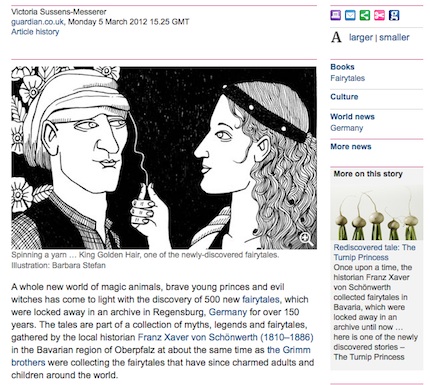
Library Lovers Day @ Broughton: Speed Dating with a difference
After discussion with the English teachers, it was decided that Year 9 would take part in our literacy event for Library Lovers Day and the launch of the National Year of Reading – Speed Dating some carefully selected books!
Fiction, Non fiction, graphic novels, biography and even poetry books were gathered and set on the tables. Students read a book for 5 minutes before rating it and moving to another table and repeating the exercise.
Students enjoyed eating a chocolate heart during their first ‘read’ and many rated their ‘dates’ with the top option on the rating sheet: “I have had a wonderful time! Could we please meet again very soon”. There were also some honest students who opted for the rating “That seemed like a very long five minutes. You’re just not my type!”
This was a very successful and interesting way to expose students to genres and books they would never have found on the shelves or tried to read. Hopefully some “lonely” books will soon be borrowed!
Read a book – Give a book
Here is a great idea as we embark on the National Year of Reading!
“We Give Books is a new digital initiative that enables anyone with access to the Internet to put books in the hands of children who don’t have them, simply by reading online.
We Give Books combines the joy of reading with the power of helping others, providing a platform for caregivers and educators to inspire children to become lifelong readers and lifelong givers.
…Simply choose the charity you want to read for and then select the books you want to read. For each book you read online, we donate a book to a leading literacy group on your behalf.”

